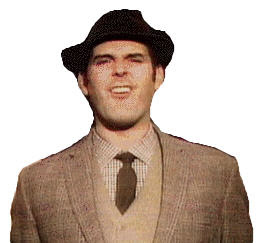(That term, by the way, popularized by Richard Dawkins, is more derogatory and incendiary than I'm generally comfortable with. But sometimes the company one must keep, here in the buckle of the Bible Belt, just makes it bubble up, benign intentions and tolerant impulses notwithstading. Sorry. But I'm leaving it in.)
A religious zealot and publisher in Murfreesboro, Tennessee named Shelton Smith comes in today for what strikes this free-thinker as a fawning and uncritical feature story in the Nashville Tennessean about his "embrace of old-time religion." That's not terribly unusual around these parts, unfortunately.
Smith, an "Independent Baptist," publishes Sword of the Lord. He is committed to halting "spiritual drift" and spreading the Verbal Inspiration of the Bible, the Deity of Christ, His Blood Atonement, Salvation by Faith, New Testament Soul Winning and the Premillennial Return of Christ; Opposing Modernism, Worldliness and Formalism."
Smith contends that only the 1872 King James Bible is inspired. All else is imposture and fraud.
So, inspiration happened once in all of recorded human history? It simply falls to you and me to salute and genuflect and defer and shut up?
Socrates and Emerson (and Twain and Nietzsche) had a lot to say about that benighted suggestion. Why are you and I here at all, if not to enjoy "an original relation to the universe" and so on? But Smith says simply: "There's what I think, and then there is what the Bible says. I'd rather go with what the Bible says."
I'd rather think about it myself, thanks all the same. I'd rather honor the inspiration that offers itself afresh every day, beginning with the sunrise, to me and you and possibly even to Shelton Smith, though I doubt he'd notice.
But what really galls about this story is the gratuitous insult to baseball fans the Tennessean reporter hurls with its first sentences: "Being a Christian is a lot like playing baseball. Get the fundamentals wrong, and everything goes to hell in a handbasket."
"Faithheads" is too kind.
















 Charles Darwin (
Charles Darwin (










